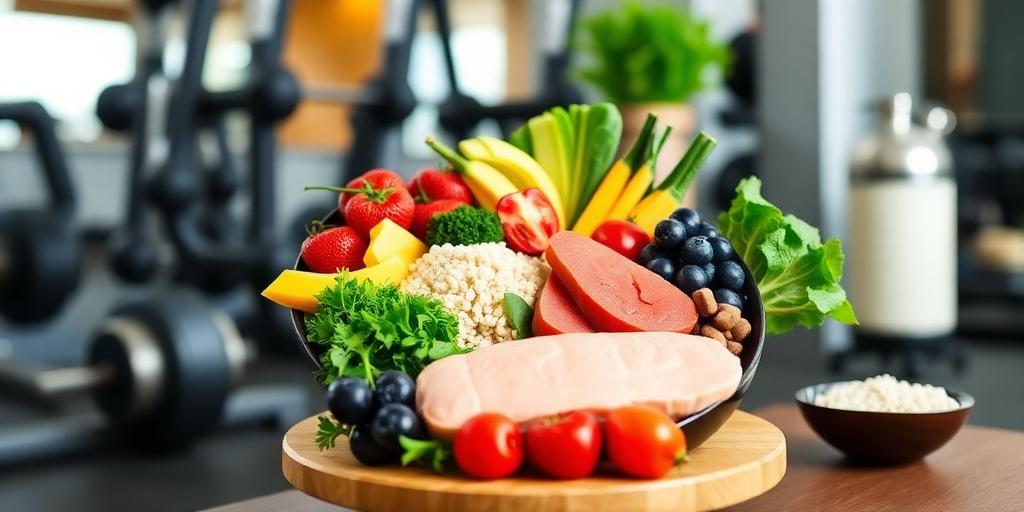5 Core Nutrition Principles for Fitness Results
Achieving your fitness goals requires more than just hitting the gym. Nutrition plays a vital role in fueling your workouts, recovering efficiently, and seeing tangible results. By understanding and implementing these five core nutrition principles, you can optimize your diet to support your fitness journey.
1. Prioritize Whole, Unprocessed Foods
The foundation of any effective nutrition plan is a diet rich in whole, unprocessed foods. These foods provide essential nutrients, vitamins, and minerals that support overall health and fitness. Focus on incorporating the following into your meals:
- Fruits and Vegetables: Aim for a variety of colors to ensure a wide range of nutrients. These provide fiber, vitamins, and antioxidants.
- Lean Proteins: Include sources like chicken, fish, turkey, beans, lentils, and tofu. Protein is crucial for muscle repair and growth.
- Whole Grains: Opt for brown rice, quinoa, oats, and whole-wheat bread. These provide sustained energy and fiber.
- Healthy Fats: Incorporate avocados, nuts, seeds, and olive oil. Healthy fats are essential for hormone production and overall health.
2. Calculate Your Caloric Needs
To gain, lose, or maintain weight, understanding your caloric needs is essential. Your daily caloric intake should align with your fitness goals.
- Basal Metabolic Rate (BMR): Calculate your BMR, which is the number of calories your body needs at rest.
- Activity Level: Adjust your caloric intake based on your activity level. Use an online calculator to determine your total daily energy expenditure (TDEE).
- Goal Adjustment:
- Weight Loss: Consume slightly fewer calories than your TDEE.
- Weight Gain: Consume slightly more calories than your TDEE.
- Maintenance: Consume calories equal to your TDEE.
3. Emphasize Protein Intake
Protein is crucial for muscle repair, growth, and overall recovery. It's particularly important if you're engaged in regular strength training or high-intensity workouts. Aim to consume:
- Recommended Intake: Generally, 0.8 to 1 gram of protein per pound of body weight is a good starting point.
- Timing: Distribute your protein intake throughout the day to maximize muscle protein synthesis.
- Sources: Include a variety of protein sources in your diet to ensure you're getting a complete amino acid profile.
4. Optimize Carbohydrate Consumption
Carbohydrates are your body's primary source of energy, especially during workouts. The type and timing of carbohydrate consumption can significantly impact your performance and recovery.
- Complex Carbohydrates: Focus on complex carbohydrates like whole grains, fruits, and vegetables. These provide sustained energy.
- Timing: Consume carbohydrates before workouts for energy and after workouts to replenish glycogen stores.
- Avoid Processed Carbs: Limit your intake of refined sugars and processed foods, which can lead to energy crashes and weight gain.
5. Stay Hydrated
Water is essential for virtually every bodily function, including nutrient transport, temperature regulation, and waste removal. Proper hydration is crucial for optimal performance and recovery.
- Daily Intake: Aim to drink at least half an ounce to one ounce of water per pound of body weight each day.
- Electrolytes: Replenish electrolytes lost through sweat, especially during and after intense workouts. Consider electrolyte-rich drinks or foods.
- Monitor Hydration: Pay attention to thirst cues and urine color. Light yellow urine indicates adequate hydration.
By integrating these five core nutrition principles into your daily routine, you'll be well on your way to achieving your fitness goals. Remember to tailor your approach to your specific needs and consult with a healthcare professional or registered dietitian for personalized guidance.









